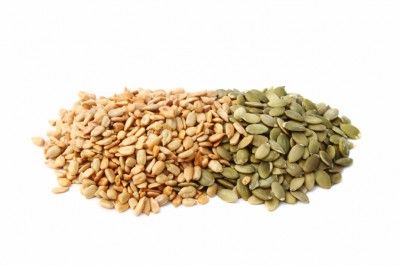Balanced Living
A Little Something for the Gentlemen
Posted by Arja on November 19 in
It’s November, and mustachioed men everywhere are raising money and awareness for prostate cancer. The straight up facts are that over 50% of men will develop an enlarged prostate (medically referred to as benign prostatic hyperplasia) in their lifetime, and because the symptoms of prostate cancer and benign prostatic hyperplasia (BPH) are very similar it’s important to get checked regularly. Men, both young and old, need to start addressing the lifestyle factors that could increase their risk factors.
The prostate is a gland the size of a walnut located at the base of the bladder. It surrounds the urethra, the small tube through which urine is excreted, and because of this, difficulty with urination is one of the hallmark symptoms of an enlarged prostate. Cancer of the prostate is one of the leading causes of death amongst men and early detection is critical to catching it before it spreads to other sites in the body.
Because of how common it is for men over age 50 to get BPH, it would appear that the hormonal changes associated with aging play a large role in the development of prostate enlargement. Symptoms include:
-frequent need to urinate
-increased nighttime urination
-difficulty stopping/starting urinating
-pain, burning
Levels of testosterone (the main male hormone) tend to decrease with age while estrogen, prolactin, luteinizing hormone, and follicle stimulating hormone all increase. The end result is an increased concentration of testosterone in the prostate gland, which then converts into a more potent form called dihydrotestosterone (DHT). Research suggests that elevated estrogen levels inhibit the excretion of DHT from the prostate gland in men suffering from BPH
So, what does this all mean? As far as BPH is concerned, prevention is key. There are dietary factors that can increase a man’s risk, so making changes earlier on is critical to maintaining a healthy prostate:
1. Avoidance of pesticides and chemicals as these are xenoestrogens which will increase overall estrogen levels in the body.
2. Maintaining an adequeate intake of zinc as this mineral plays a huge role in hormone metabolism and can inhibit testosterone from converting to its more potent form. Zinc can also inhibit prolactin secretion, and increased prolactin is associated with increased uptake of testosterone by the prostate.
3. Eating more essential fatty acids through food and supplements has shown significant improvement for many men suffering from BPH. This is especially true where a preexisting deficiency exists.
4. Reduced intake of alcohol, in particular beer, is important as beer in particular increases prolactin levels.
5. Managing cholesterol levels can help because cholesterol damaged by free radicals is toxic and carcinogenic to the prostate.

Eating a whole foods based diet, rich in legumes, high quality protein, whole grains, vegetables, fruits, nuts, and seeds may seem like the obvious route to take, but there are definitely some foods that are particularly important to focus on:
-raw pumpkin or sunflower seeds (1/4 cup daily) contain high levels of zinc and phytosterols (you can also use pumpkin seed oil)
-tomatoes, spinach, kale, mangoes, broccoli, and berries are all rich sources of lycopene, a carotenoid which promotes prostate health and can help prevent prostate cancer
-flax seeds and chia seeds are both excellent sources of both fibre and essential fatty acids (EFAs)
-cold water, fatty fish are a high quality, lean protein and contain high levels of EFAs
-moderate amounts of soy can help balance testosterone metabolism due to their phytosterol content
Saw Palmetto is an herb commonly used in the treatment of BPH, and often with good results and fewer side effects than are seen with medication. Herbal remedies are slower acting than medications, and it’s important to get your herbs from a respected source in order to ensure quality. Other herbs often used to manage BPH include Pygeum Africanum extract, stinging nettle extract, and Cernilton (a flower pollen extract). Consult with a practitioner for recommended doses and for recommendations on where to purchase your herbal remedies.
At the end of the day, prevention is your best medicine so men, take care of your jewels now! Waiting until symptoms start, or have been going on for a prolonged period of time can make treatment more challenging. And please, get regular prostate check-ups.



